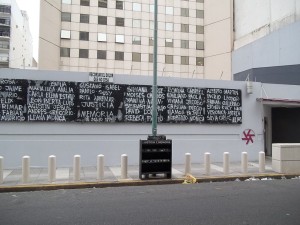The 86th Victim
It was a quiet winter morning in downtown Buenos Aires. July 18, 1994 was set to be a day gone by in Argentine memory; today that date brings memories of death and terror. A Renault Trafic van parked in front of the AMIA (Asociacion Mutual Israeli-Argentina/ Israeli-Argentine Mutual Association) headquarters and detonated with the force of the 275 kilograms of ammonium nitrate it carried. It was the worst terror attack in the

history of Argentina and Latin America. The resulting blast destroyed the building, injuring hundreds and killing 85. Last week, more than 20 years later, the attack took its 86th victim.
Alberto Nisman was appointed by President Nestor Kirchner 10 years ago as the lead investigator of the AMIA case. Nisman, a federal prosecutor, hoped to find those responsible for the attack. On October 25, 2006, Nisman formally accused the Shi’a militant group Hezbollah as the perpetrator of the attack, acting under orders of the state of Iran. The following year, Interpol added six Iranian officials to its Red Notice List, calling for their detention. So far, none of them have been brought to justice. Although Nisman’s accusations pointed to Iran as the force behind the attack, President Cristina Fernandez de Kirchner signed with the Islamic Republic in 2013 a “Memorandum of Understanding”, a joint investigation into the AMIA case. Nisman publicly rejected the memorandum.
Continuing into his investigation, Nisman shocked the country earlier this year, accusing President Fernandez and Foreign Minister Hector Timerman of secret making deals with Iran. The Argentine state was set to sell grain cheaply to the Islamic Republic in exchange for oil, however this could only be possible if Argentina took the six Iranian officials off the Interpol Red Notice List. Little wonder, then, that the government immediately denied Nisman’s accusations. Nisman was ordered to reveal his evidence in a Congressional hearing on Monday, January 19, 2015. Yet 12 hours before the hearing, Nisman was found dead in the bathroom of his apartment, shot in the head.
As soon as the news hit the waves, Argentina fell into panic. Conspiracy theories and accusations began to arise. People started mobilizing in the
streets, shouting murder, and stating stating Je suis Nisman, alluding to the recent attacks on France’s Charlie Hebdo. The state media after quickly published a letter by the President, suggesting that Nisman committed suicide. More evidence arised, however, prompting the President to release another letter, this time advocating the murder theory.
Nisman’s death has divided the Argentine perception of the government. While some remain distrustful of Fernandez’s cabinet, others viciously deny any government involvement in his death. With elections coming up this year, the case may affect Fernandez’s Frente Por la Victoria party’s electoral prospects. This case is also critical for foreign policy. Iran, after coming into the spotlight, has denied any involvement in Nisman’s passing. Furthermore, many people abroad, including US lawmakers, have called for an international, independent investigation.
In his opinion note published in La Nacion, journalist Carlos Pagni recalls the story of the first anniversary of the AMIA bombing. Witnessing the inconsolable cries of the victim’s families, the Israeli ambassador to Argentina asks one of his aides “Why are they so desperate? In Israel a lot more people die like this.”, to which the aide responded “They are desperate because they know justice will never be done.” Today many Argentines, including your correspondent, are desperate.

